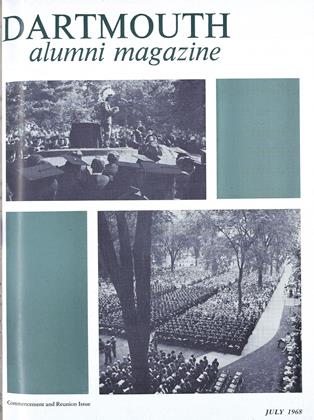Letters to the editor in this issue indicate serious alumni concern about the valedictory address by James Newton '68. It is understandable that there should be such dismay, because certain statements in the address were unreasonably extreme, and were all the more unfortunate because the occasion served to magnify what were intensely personal views.
Having said this in disagreement with the insupportable parts of an otherwise impressive address, we consider it also unfortunate that on the basis of sketchy and not entirely accurate newspaper accounts there is such readiness to indict the Class of 1968 and the College. It was a reltively small part of the Class that applauded Newton's extreme statements, and it is certainly true that the support demonstrated then and at the end of the address was in part a younger generation's rejoinder to the boos and catcalls from the general audience.
Senator Javits in his Commencement Address later in the program made a forceful reply to Newton's remarks, and set forth a challenge to the seniors to work for the solution of the nation's heavy problems through political and community action. Almost the entire graduating class joined in the standing ovation given to Senator Javits as he finished. The Newton-Javits dialogue produced an extraordinary Commencement morning, in tune with the times, and this free and open exchange on a college campus was an example of what American higher education is all about.
Some incensed alumni have asked: How could such a speaker be chosen, and how could the College permit him to say such things? The valedictory speaker is chosen by the Committee on Commencement from a half-dozen seniors of the highest academic rank, taking into account his entire undergraduate career and his record as a responsible member of the College community. Once chosen, he is accorded the same freedom as any other Commencement speaker. The question raised on this point must be reversed: How could any self-respecting college, especially one with Dartmouth's proud tradition of academic freedom, not permit him to speak without hindrance or check, "in the confidence of his own very individual conviction and conscience"? — to use a phrase from the honorary- degree citation of Senator Javits. Freedom of thought and speech is a difficult, thorny business in colleges as elsewhere, but an ever-present risk must be embraced in preference to a repugnant censorship.
The College on Commencement morning had to ride out some jolting and unrepresentative moments, but by being true to its avowed purpose and paying more than lip service to freedom of speech it was in no way diminished in our eyes.
 View Full Issue
View Full Issue
More From This Issue
-
 Feature
FeatureNon-Violent Change in Our Society
July 1968 By THE HON. JACOB K. JAVITS, LL.D. '68 -
 Feature
Feature"People as Well as Things"
July 1968 By HARVEY P. HOOD '18 -
 Feature
FeatureThe Senior Valedictory
July 1968 By JAMES WITTEN NEWTON '68 -
 Feature
FeatureHONORARY DEGREE CITATIONS
July 1968 -
 Feature
FeatureReunion Week: Fun Plus Education
July 1968 -
 Feature
FeatureCouncil Honors Three Alumni
July 1968
C.E.W.
-
 Article
ArticleL'Ecole Tuck
December 1950 By C.E.W. -
 Article
ArticleTHE COLLEGE
December 1951 By C.E.W. -
 Article
ArticleIvy Group Agreement
October 1952 By C.E.W. -
 Feature
Feature"Red" Rolfe '31 to Return As Director of Athletics
January 1954 By C.E.W. -
 Article
ArticleFINE ARTS AWARD
DECEMBER 1962 By C.E.W. -
 Books
BooksQUICK GUIDE TO WINE.
NOVEMBER 1966 By C.E.W.







